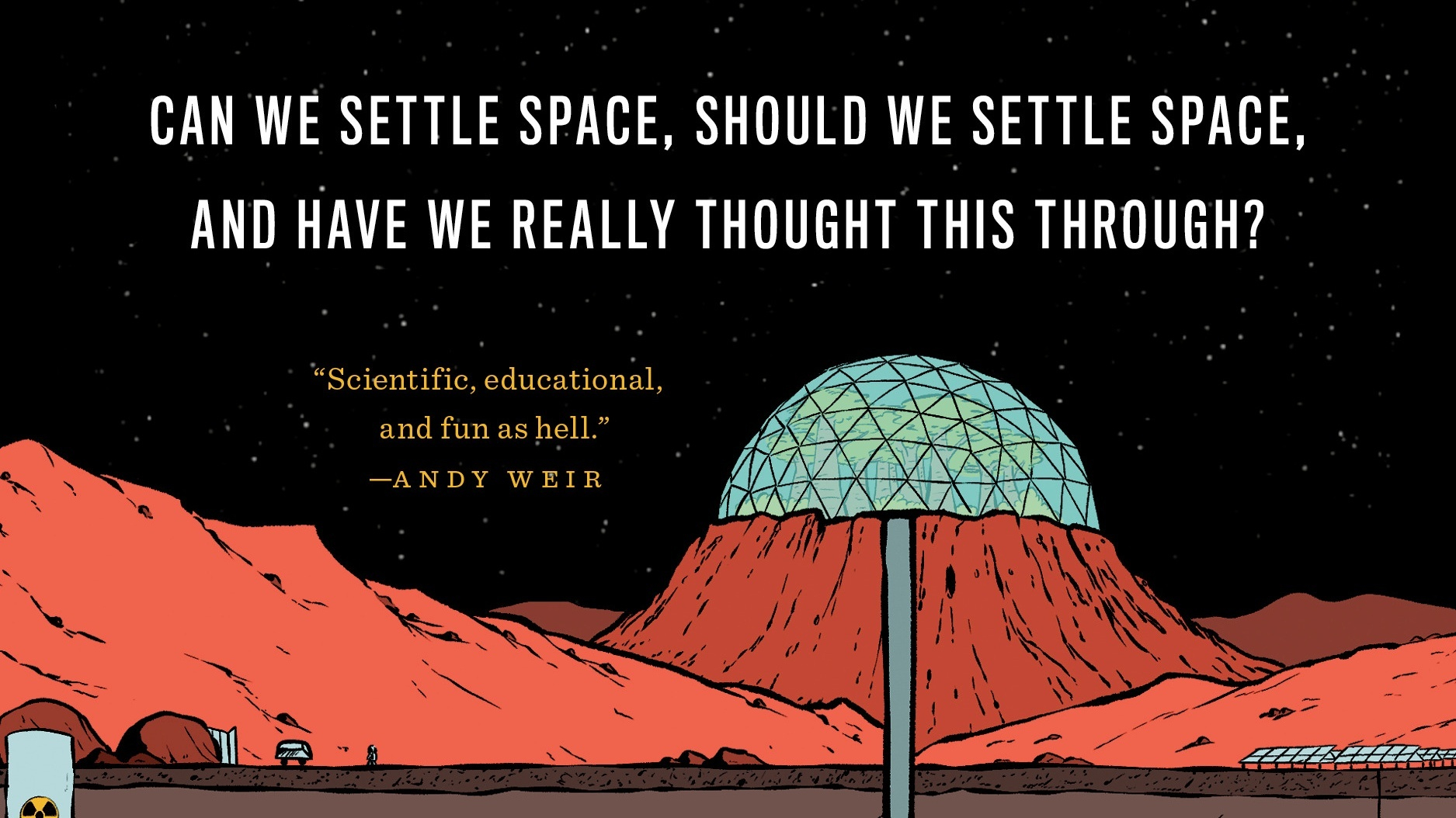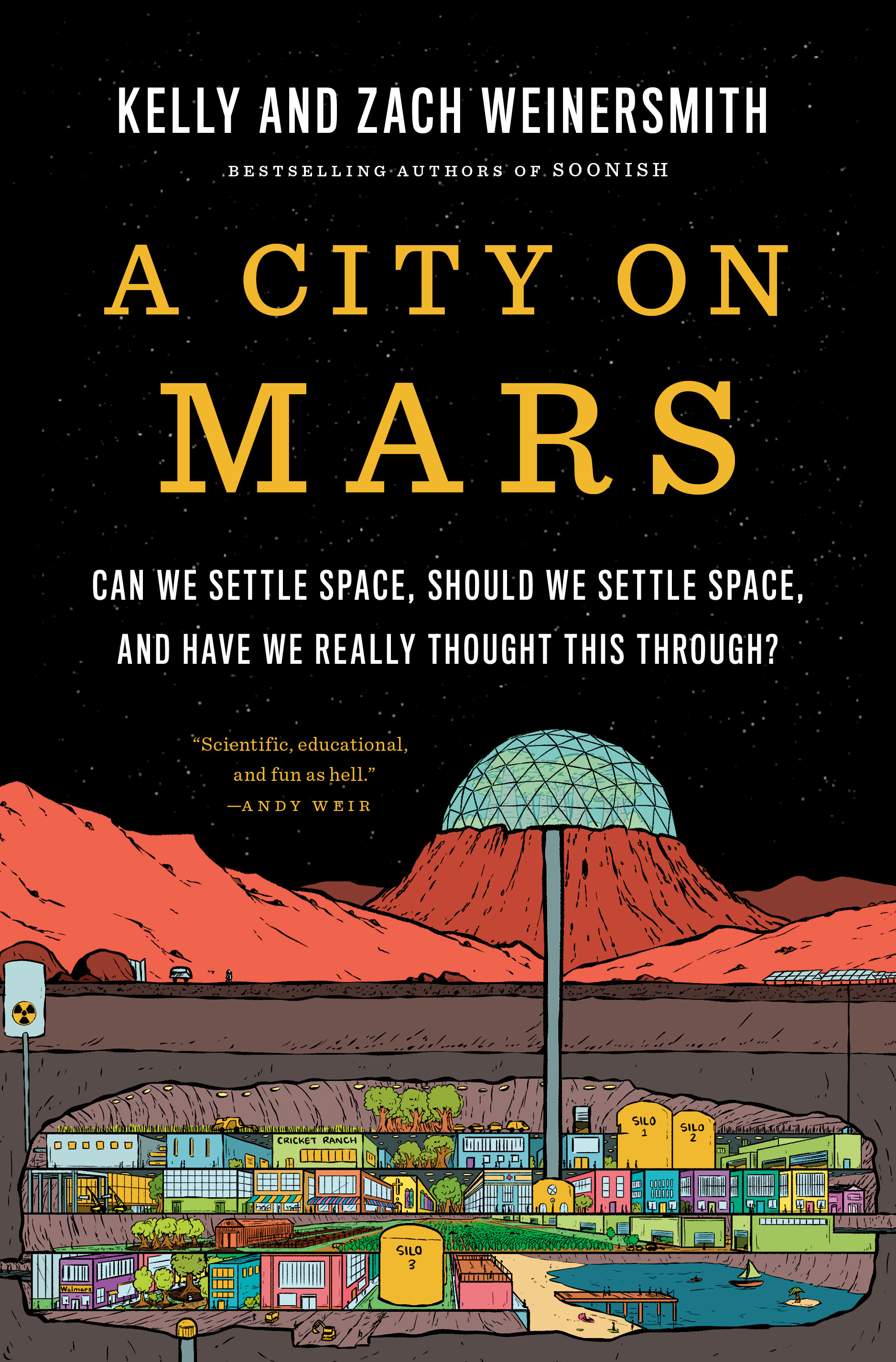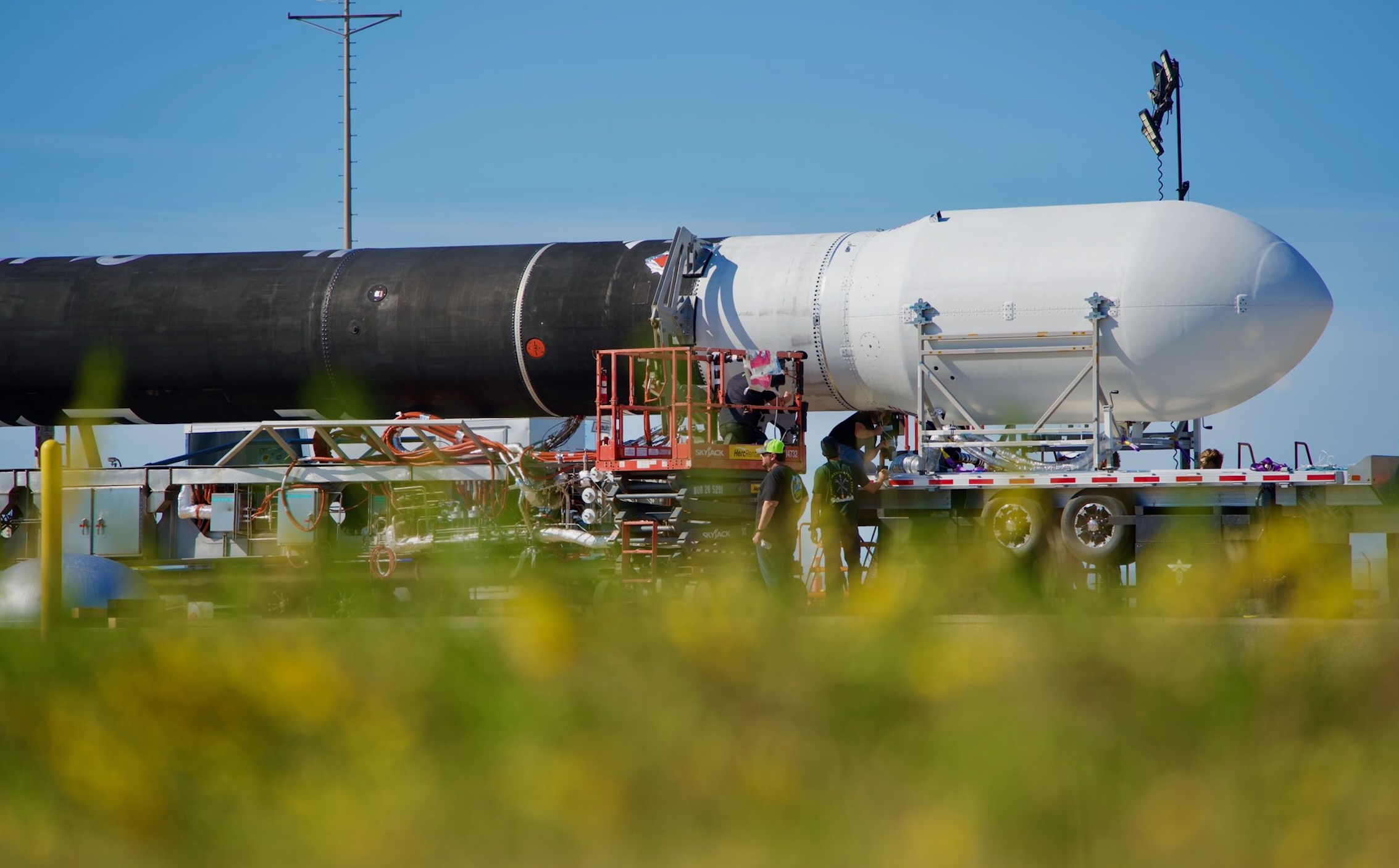'A City on Mars' is a reality check for anyone dreaming about life on the Red Planet
It wasn't until maybe a year before we were done writing — and we wrote for four years — that we decided this book is actually about why space settlements aren't coming soon.

Breaking space news, the latest updates on rocket launches, skywatching events and more!
You are now subscribed
Your newsletter sign-up was successful
Want to add more newsletters?
These days, it feels almost a given that humanity will soon become a multiplanetary species, perhaps as soon as 2050. Setting up colonies on the moon and Mars is a tantalizing goal, perhaps even a necessary one for those who believe it to be a backup strategy that can save humanity from crumbling due to catastrophe.
However, space settlement — developing livable stations outside Earth so humans can stay there for years, perhaps forever — is currently naively optimistic, according to authors Kelly and Zach Weinersmith. It needs a dose of realism, they say.
The Weinersmiths are self-described "space bastards" who remain excited about space exploration and settlement but argue many first-order questions of how human life works in space, like in terms of reproduction, space farms, democracy and legal frameworks (to name just a few concerns) need to be answered before humans can actually live in space.
The authors systematically tackle these questions in depth in their engaging new book: "A City on Mars: Can we settle space, should we settle space, and have we really thought this through?" (Penguin Press, 2023).
(Read an excerpt from "A City on Mars.")
"A City on Mars" is a breezy read about human space settlement, blending together subjects like history, psychology, law and, of course, the sciences, into an honest yet hilarious summary of the field. Despite the sobering outlook for humanity's future beyond Earth, delightful cartoons sprinkled throughout the book are sure to pull chuckles out of you.
Space.com sat down with Kelly Weinersmith to discuss the book. This interview has been edited for length and clarity.
Breaking space news, the latest updates on rocket launches, skywatching events and more!
How did this book come about for you?
Weinersmith: My husband and I wrote a book called Soonish about emerging technologies. It had two chapters related to space that made us feel like, between the dramatically falling costs of launching stuff to space and our maybe near-term ability to extract resources from asteroids, space settlement might be a thing in our lifetime. We wanted to write about what the next couple decades are going to be like: How do you pick a crew for the first mission to Mars? How do you pick the first group of people to live on Mars?
That's the book we pitched, that's not the book we wrote. The more research we did, the more we felt like settling Mars was way out in the future, not the next couple decades. In fact, if we rushed it, it could be to our detriment because we don't know enough.
So when did you realize the public discourse around space settlement is not realistic?
Weinersmith: Pretty early on, my husband and I had moments where we were like, 'Oh, I'm surprised we haven't come across this information in the literature before.'
For example, the moon is carbon-poor. Being carbon-based lifeforms, that means we're going to have to bring a lot of carbon up there if we are going to be making humans and if we are going to be growing plants — all of those things require carbon. The soil on Mars is laden with perchlorates, which is a chemical that binds to your thyroid and messes with all the hormones your thyroid makes. We were like, 'That doesn't seem like a great environment to be having kids in.'
And so every chapter ended up being slightly more critical, and then over time, we sort of realized that we were writing about different things. The chapter on how you pick the members to go in the first crew got cut and instead, we ended up adding a couple chapters on international law and how you might actually govern the commons.
But it wasn't until like three quarters of the way through where our editor was like, 'Okay, you guys are still trying to make this book sound like space settlements are awesome and coming soon, but you clearly don't believe that anymore.'
It wasn't until maybe a year before we were done writing — and we wrote for four years — that we decided this book is actually about why space settlements aren't coming soon instead of why they are coming in the next decade or two.
The book explores many questions and challenges about becoming multiplanetary humanity hasn't addressed yet. Are there any you find particularly concerning?
Weinersmith: The geopolitical problems are maybe the most concerning. If the U.S. and China, for example, end up in a rush to claim the best parts of the territory on the moon — which are very small — that could be bad. You don't want to have conflict between nuclear arms powers, especially over such crummy turf! That might be the most existentially scary thing.
But for me, the thing that was the most uncomfortable was thinking about what life would be like if you had babies on Mars. Musk talks about having boots on the ground by 2029 and, two to three decades after that, having a million people there. I think he has said something to the effect of, 'We don't need to worry about the reproduction angle. You can just send a million people out there to make it self-sustaining and then we can figure that stuff out later.'
But I can't imagine a million people being like, 'We're just not gonna have sex or babies until this is all figured out and we know it's safe.' That's not how humans function. Between not understanding how we respond to partial gravity and what the kind of radiation you encounter on Mars is likely to do during developments, to having everything figured out so you can get the perchlorates out of the soil before you're using it to grow your plants, it feels like human experimentation — to be going out to Mars without doing a lot more research.
Did your research reveal why the public discourse around space settlements is not comprehensive yet?
Weinersmith: I think the issue is that a lot of what you read is written by advocates for space settlements. When we talked to people about how we wrote a book about how space settlements aren't coming soon, one of our friends, who's another pop-sci author, was like, 'Nobody wants to read a book about how the dream is a bad dream.'
There are not a lot of books where people want to be wet blankets. And what does get written tends to be written by advocates who are excited about it. It is a beautiful dream to pitch, so I think it's easier to pitch this as a cool dream than to explain why we need to slow it down. I'm still excited about space settlements but I do think we gotta slow it down a lot.
So what do you hope space settlement advocates take away from "A City on Mars?"
Weinersmith: Well, I heard from some of them already who have said that they read it. That, to me, is the first step. I love to know that they are thinking about some of this stuff.
Most of us specialize. I'm an adjunct faculty at Rice University. I study a very particular kind of parasite and how it manipulates the behavior of fish in particular. So I get that we really narrow down, especially in academia, but the space settlement picture looks scarier when you take a big step back and you look at how all of the different pieces are incomplete right now.
I would love it if everybody who has their own specialty read the book so they could take a broader step back and look at everything. And then I'd love to see us discussing these issues more. I don't think any of these issues need to stop us from going to Mars. I think they are things we need to work on. Also, I think it is inspiring for the next generation. There's so many cool questions that need to be answered still and so much cool work to be done in international law, reproduction in space, etc.
What about readers outside of academia? What do you hope they take away from the book?
Weinersmith: When you're reading pop articles about space settlement, there's usually a lot that's left out.
You'll hear, 'We're gonna go to the moon and collect helium-3, and helium-3 is going to be awesome.' Actually, long story short, helium-3 is probably not going to be a great investment in my opinion — we go into it in the book — but anytime you read an article about space settlement, you should realize there's probably a lot that's left out. All of these issues are incredibly complicated, and the way that they're complicated is interesting. So I would love the public to have a more nuanced view of all of the different things that go into space settlement, why it's complicated and why we can still be excited about it but we shouldn't rush.
How did your background as an ecologist and Zach's as a cartoonist shape the way you look at space exploration and space settlement?
Weinersmith: We divided things up in a way that worked well for us. This is the second book we worked on together, so we already knew that we could use Zach's comedy — he wrote most of the jokes in the book — to make it a little bit easier to stomach really complicated topics.
As someone who is in academia, I really like more detailed explanations; I want to know why things work the way they do. Between the two of us, we were able to do four years of research with both of us reading for a couple hours a day, so we were able to amass that knowledge together.
The book starts with biology, so that made it easier for me to get started. At the end of the day, we're both mega nerds. When it came time to do international law, Zach got the giant textbook on the United Nations Convention on the Law of the Sea and I got the textbooks on the Outer Space Treaty, and we both just read for months at a time until we felt like we understood it.
The Outer Space Treaty is like 2,000 words. It's so easy to read it and think, 'Oh, I understand it.' But once you also read the law, there is a lot of interpretation that goes into it and the history of how it was written impacts how it is interpreted.
Do you still see space exploration and settlement as a realistic endeavor that embodies the best of humanity?
Weinersmith: In my mind, I separate space exploration and space settlement. When I think about settlement, I am explicitly thinking about people planning on spending their entire lives in one location and having babies and raising families, whereas space exploration in general, I am super excited about. I am not a sentimental person, but I got up in the middle of the night to watch Curiosity land on Mars and I cried for the first time in a decade.
Space exploration is some of the best of what humans do. I'd love to see us put boots on Mars at some point. I think that we need to be careful because, for example, if we put people on the moon and we set up a station and it stays there, there's still a lot of ambiguity in terms of international law. You haven't claimed sovereignty of the land underneath your station, so in that way, you haven't violated the Outer Space Treaty. But if you never leave and it's in one of the only good spots on the moon, how is China going to feel about that? Exploration still has some of these geopolitical things to keep in mind, but I remain super excited about it.
What did writing the book teach you about Earth?
Weinersmith: The more we read about Mars and the moon, the more we appreciated just how incredible Earth is and how hard it would be to try to eke out an existence on the moon or Mars. Earth with climate change, maybe some nuclear bombs set off, and werewolves and zombies is still way better than living on the moon or Mars because those environments are just so harsh.
I am an ecologist and I've helped describe some of the wasp species. There are no wasps on the moon or Mars. At the end of the day, I would never leave Earth; I don't want to go somewhere where there are no new wasps to discover!
I have always loved Earth, but I appreciate more all the ecosystems it provides us that you just don't get in a desolate wasteland like the moon or Mars.
You can buy "A City on Mars" on Amazon or Bookshop.org.

Sharmila Kuthunur is an independent space journalist based in Bengaluru, India. Her work has also appeared in Scientific American, Science, Astronomy and Live Science, among other publications. She holds a master's degree in journalism from Northeastern University in Boston.

